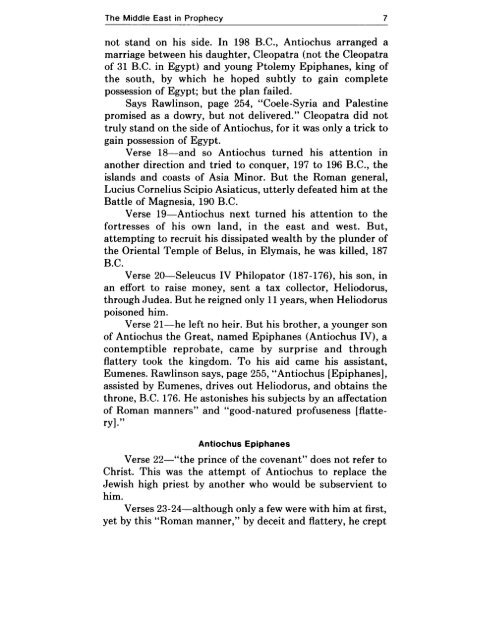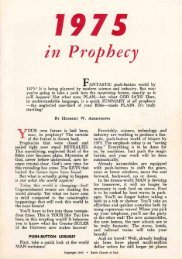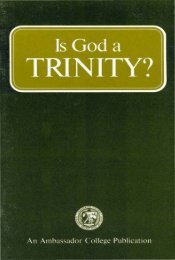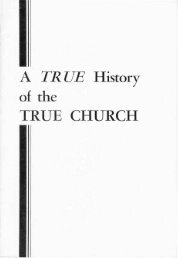The Middle East in Prophecy PDF - Church of God Faithful Flock
The Middle East in Prophecy PDF - Church of God Faithful Flock
The Middle East in Prophecy PDF - Church of God Faithful Flock
Create successful ePaper yourself
Turn your PDF publications into a flip-book with our unique Google optimized e-Paper software.
<strong>The</strong> <strong>Middle</strong> <strong>East</strong> <strong>in</strong> <strong>Prophecy</strong> 7<br />
not stand on his side. In 198 B.C., Antiochus arranged a<br />
marriage between his daughter, Cleopatra (not the Cleopatra<br />
<strong>of</strong> 31 B.C. <strong>in</strong> Egypt) and young Ptolemy Epiphanes, k<strong>in</strong>g <strong>of</strong><br />
the south, by which he hoped subtly to ga<strong>in</strong> complete<br />
possession <strong>of</strong> Egypt; but the plan failed.<br />
Says Rawl<strong>in</strong>son, page 254, "Coele-Syria and Palest<strong>in</strong>e<br />
promised as a dowry, but not delivered." Cleopatra did not<br />
truly stand on the side <strong>of</strong> Antiochus, for it was only a trick to<br />
ga<strong>in</strong> possession <strong>of</strong> Egypt.<br />
Verse 18-and so Antiochus turned his attention <strong>in</strong><br />
another direction and tried to conquer, 197 to 196 B.C., the<br />
islands and coasts <strong>of</strong> Asia M<strong>in</strong>or. But the Roman general,<br />
Lucius Cornelius Scipio Asiaticus, utterly defeated him at the<br />
Battle <strong>of</strong> Magnesia, 190 B.C.<br />
Verse 19-Antiochus next turned his attention to the<br />
fortresses <strong>of</strong> his own land, <strong>in</strong> the east and west. But,<br />
attempt<strong>in</strong>g to recruit his dissipated wealth by the plunder <strong>of</strong><br />
the Oriental Temple <strong>of</strong> Belus, <strong>in</strong> Elymais, he was killed, 187<br />
B.C.<br />
Verse 20-Seleucus IV Philopator (187-176), his son, <strong>in</strong><br />
an effort to raise money, sent a tax collector, Heliodorus,<br />
through Judea. But he reigned only 11 years, when Heliodorus<br />
poisoned him.<br />
Verse 21-he left no heir. But his brother, a younger son<br />
<strong>of</strong> Antiochus the Great, named Epiphanes (Antiochus IV), a<br />
contemptible reprobate, carne by surprise and through<br />
flattery took the k<strong>in</strong>gdom. To his aid carne his assistant,<br />
Eumenes. Rawl<strong>in</strong>son says, page 255, "Antiochus [Epiphanes],<br />
assisted by Eumenes, drives out Heliodorus, and obta<strong>in</strong>s the<br />
throne, B.C. 176. He astonishes his subjects by an affectation<br />
<strong>of</strong> Roman manners" and "good-natured pr<strong>of</strong>useness [flattery]."<br />
Antiochus Epiphanes<br />
Verse 22-"the pr<strong>in</strong>ce <strong>of</strong> the covenant" does not refer to<br />
Christ. This was the attempt <strong>of</strong> Antiochus to replace the<br />
Jewish high priest by another who would be subservient to<br />
him.<br />
Verses 23-24-although only a few were with him at first,<br />
yet by this "Roman manner," by deceit and flattery, he crept

















